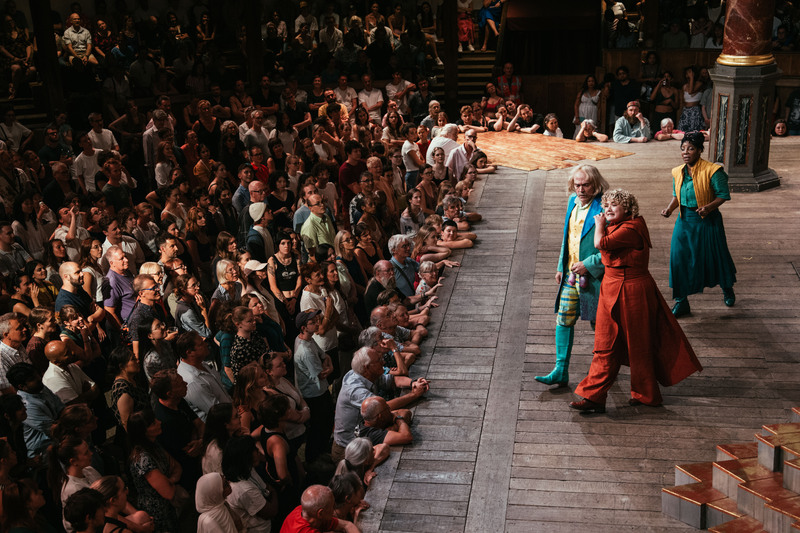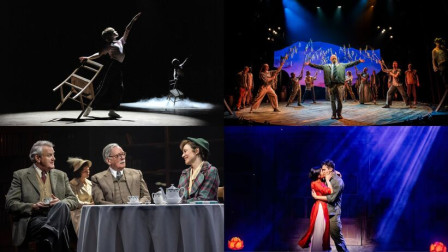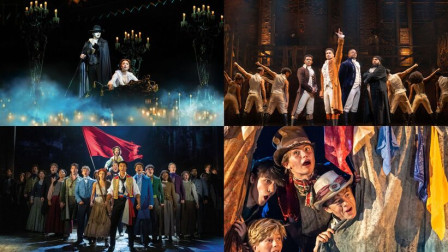Review: TWELFTH NIGHT or WHAT YOU WILL at Shakespeare’s Globe
The 6th of January was the assumed Candlemas target date for the first night performance to be given before Elizabeth I in 1602, and TWELFTH NIGHT has therefore remained the title by which the play is generally known. However, WHAT YOU WILL lingers as its supplementary nomenclature (and most likely originally intended) title.
 Ian Drysdale, Emmy Stonelake and Jocelyn Jee Esien in 'Twelfth Night or What You Will' at Shakespeare's Globe. Photo by Helen Murray
Ian Drysdale, Emmy Stonelake and Jocelyn Jee Esien in 'Twelfth Night or What You Will' at Shakespeare's Globe. Photo by Helen Murray
Shakespeare’s romantic comedy, set at the imagined maritime state of Illyria, pivots on mistaken identities and twins separated by a shipwreck, to spin its frivolous and convoluted yarn. Viola (Ronkẹ Adékọluẹ́jọ́) mourns her lost brother Sebastian (Kwarmi Odoom) just as he mourns the loss of his sister, but perhaps unsurprisingly they are destined to be reunited in the play’s final act. Before then, Sebastian finds solace with sea captain Antonio (Max Keeble), while she assumes the identity of Cesario, a boy page in the service of Duke Orsino (Solomon Israel), with whom she is secretly in love. He however, dispatches Cesario on a mission to woo Countess Olivia (Laura Hanna) in his behalf, leading perhaps predictably to Olivia instead developing an attraction for Cesario thereby establishing a gender-confused love triangle. Thrown into this mix are a pompous and dour steward Malvolio (Pearce Quigley) who revels in spoiling the household’s general merrymaking setting-up a secondary plot in which Olivia’s aunt Lady Belch (Jocelyn Jee Esien) aided by servants Maria (Alison Halstead) and Fabian (Emmy Stonelake), house fool Feste (Jos Vantyler), and Olivia’s sometime suitor Sir Andrew Aguecheek (Ian Drysdale), attempt to discredit and humiliate Malvolio.
Amidst the hetero-confusions and gender-fluidity in director Robin Belfield’s production, there’s a great deal to enjoy and appreciate, not least the many splendid set piece moments of hilarity and jovial horseplay, aided by considerable breaking of the fourth wall. But there are patchy segments too and the whole doesn’t quite gel into the seamless comedy one hopes for. For this production Simon Slater has composed music for a 5-piece on stage ensemble which initially threatened to swamp the dialogue on press night, but audibility was quickly restored, leaving the cast with only the 21st century overhead intrusions with which to contend.
Jean Chan’s hollow golden sun set decoration, places the elevated musicians centre stage but set apart from the rumbustious shenanigans of the gaudily adorned cast (courtesy of Lydia Hardiman) where African motifs vie with sci-fi sheen and rococo flounce, to create a visual splash.
Central to the piece, are Malvolio and Viola but whilst both Quigley and Adékọluẹ́jọ́ relish in their moments to parade and grandstand, their inherent acting chops also imbue a sense of their characters’ underlying vulnerabilities and disappointments. This serves to underpin the Bard’s fanciful farce with genuine humility and humanity, even during moments of high comedy. The result is a hugely fun, if not entirely perfect evening of entertainment.
TWELFTH NIGHT plays at Shakespeare's Globe until 25 October.
Latest News

 This Month in the West End (February 2026)
27 February 2026 at 16:45
This Month in the West End (February 2026)
27 February 2026 at 16:45

 Cameron Mackintosh reveals extension periods for West End productions to 2027
27 February 2026 at 16:08
Cameron Mackintosh reveals extension periods for West End productions to 2027
27 February 2026 at 16:08

 TITANIQUE announces fourth extension
27 February 2026 at 15:55
TITANIQUE announces fourth extension
27 February 2026 at 15:55

 Florian Zeller’s Olivier Award-nominated comedy 'The Truth' to head to the West End this summer
27 February 2026 at 11:06
Florian Zeller’s Olivier Award-nominated comedy 'The Truth' to head to the West End this summer
27 February 2026 at 11:06
